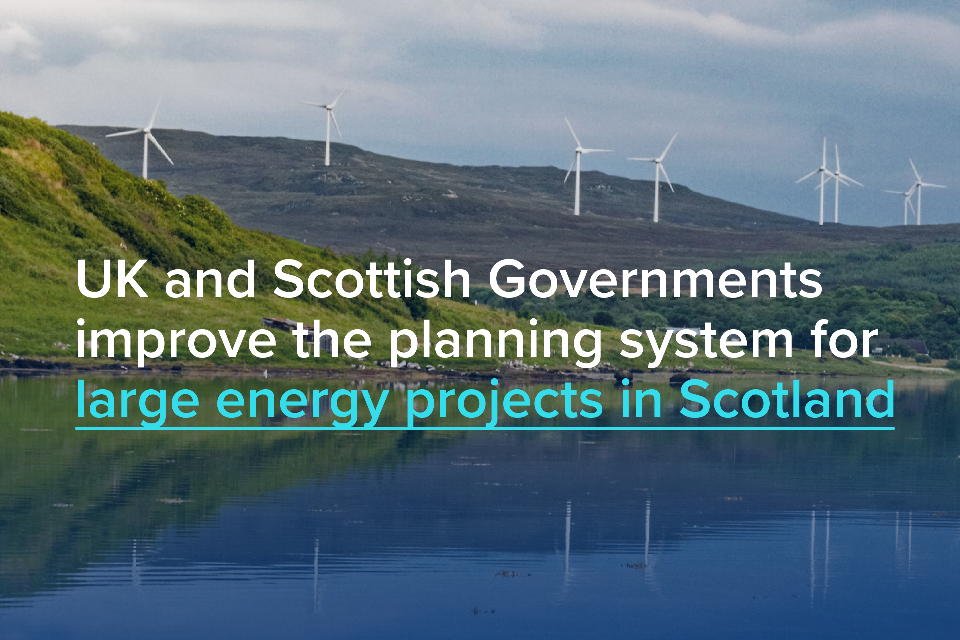- UK and Scottish governments set out proposals to streamline the system for determining energy infrastructure consents in Scotland
- consultation to reform outdated processes with the aim to cut delays and create a fairer system, in which communities can have their say from the outset
- the move could help to unlock Scotland’s pipeline of energy projects, driving forward the UK’s clean power mission and energy independence
The planning process for new clean energy infrastructure in Scotland will be improved under UK and Scottish government proposals to reform outdated legislation that can delay new projects being built.
In collaboration with the Scottish Government, the UK government has today (28 October) launched a consultation on proposed changes that will make the system for considering large energy projects in Scotland more efficient, while also ensuring that affected communities can have their say on proposals at the right time in the process.
Currently it can take up to 4 years to approve large electricity infrastructure projects in Scotland, such as power lines and onshore wind farms, under UK legislation that has been in place since 1989.
This system can create uncertainty for investors and communities, which in turn can lead to higher costs being passed onto bill payers. In England and Wales, new large-scale electricity projects can take around half as long on average to be determined compared to Scotland, thanks to previous legislative reforms to streamline the process.
By making vital updates to the energy consents system in Scotland, the UK and Scottish governments aim to support the rollout of new clean energy projects while giving communities early and meaningful opportunities to be heard. The consultation proposes making it a requirement that communities and wider stakeholders are consulted at pre-application stage.
Energy Minister Michael Shanks said:
Scotland has huge potential to propel the UK towards our clean power by 2030 goal, with its natural resources, energy expertise and highly skilled workforce.
Together with the Scottish Government, we are modernising outdated bureaucratic processes to make sure Scotland is firmly open for business as we build the UK’s clean energy future.
This will help to accelerate new clean, homegrown energy – taking us a step closer to energy independence and protecting billpayers from the rollercoaster of volatile fossil fuel markets for good.
Acting Cabinet Secretary for Net Zero and Energy Gillian Martin said:
These long-awaited UK legislative reforms will help support Scotland realise our clean power ambitions, while providing investors with confidence that a more robust and efficient process is being applied.
This will in turn support our net zero ambitions, enable economic growth and ensure our communities have an enhanced opportunity to be heard.
Today’s announcement forms the next step in joint work from the 2 governments to cement Scotland’s role in making the UK a clean energy superpower.
It comes after the UK government confirmed Aberdeen as the headquarters for the publicly-owned company Great British Energy, that will own and invest in clean power projects across the UK. This month, Scottish and UK governments also signed an agreement to support clean energy supply chains and infrastructure, via new partnerships between Great British Energy and Scottish public bodies.
Proposed reforms
The proposed reforms aim to provide developers and communities with an updated system when submitting plans for large clean energy projects. The changes cover the entire process from pre-application to challenging decisions, tackling issues that have already been addressed in England and Wales under previous reforms. They include:
Pre-application requirements
New standardised processes for both onshore and offshore developers to engage with local communities and stakeholders before submitting an application to the Scottish Government for new energy infrastructure. This will involve communities at an earlier stage and improve the quality and speed of applications, with new powers for the Scottish Government to reject any that do not meet requirements. The Scottish Government will also be able to charge fees for pre-application services, helping to deliver the new system effectively.
Appealing decisions:
Standardising the appeals process, with set criteria for challenging decisions on new energy infrastructure and a 6-week time limit in which objections can be raised. Currently challenges to large onshore projects must be brought by judicial review within 3 months, which can lead to lengthy delays.
Public Inquiries:
Reforming the public inquiry process which is automatically triggered when Planning Authorities raise objections to new energy infrastructure. These inquiries can take an average of 18 months and have cost the Scottish Government £1.9 million since 2021. Under the proposals, inquiry sessions will still be held where necessary, but other forms of decision making will also be deployed on a case-by-case basis guided by a specialist reporter.
Changes to planning consent:
New powers to allow the Scottish Government to revoke, suspend or vary consents for energy infrastructure projects under specific circumstances. This will allow for necessary amends to be made, without the applicant having to restart the process.
Necessary wayleaves:
A new power for the Scottish Government to charge developers a fee for submitting wayleave applications to place overhead lines on private land. Similar fees are charged in England and Wales, and will help the Scottish Government to meet an expected increase in applications in the rollout of new clean energy projects.
Notes to editors
The consultation, launched today, will run for 4 weeks until 26 November.
All decisions on new energy infrastructure projects in Scotland are devolved and applications over 50MW are made to the Scottish Government. The UK government is responsible for energy policy and the legislative framework (Electricity Act 1989) is reserved for the UK Parliament.
Changes to the Planning Act 2008 (such as Nationally Significant Infrastructure Projects) helped to speed up decision making on energy infrastructure projects in England and Wales. The proposed reforms in this consultation will update the approvals process for energy infrastructure in Scotland.
Following the consultation process, the UK government will bring forward the necessary legislation as soon as Parliamentary time allows.


